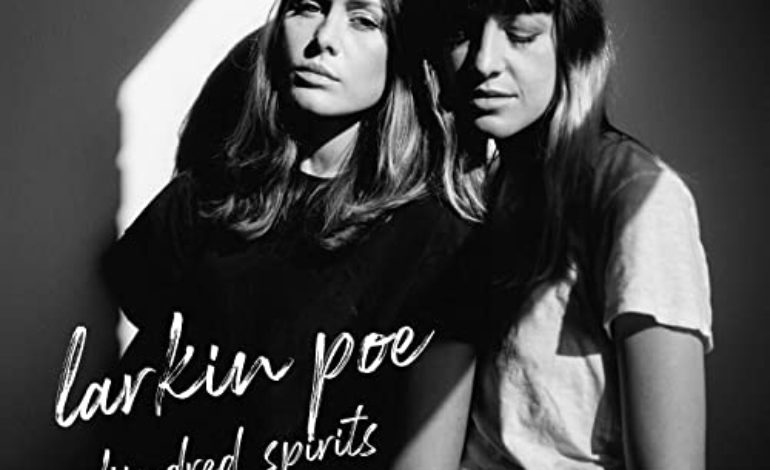

An occasionally good “acoustic” missed opportunity
Larkin Poe, a Georgian-based sister act who’ve received a lot of fanfare as women in blues-rock on their own independent label, have described their sixth record, second in 2020 and first composed of covers, as an acoustic album, which is technically accurate and yet deceptive at the same time. Rebecca and Megan Lowell started out in a folk and bluegrass band fittingly called the Lowell Sisters, before moving to the harder rock edge and gritter tones of Larkin Poe. It would have been nice and refreshing to hear a return to the sound of their previous outfit as a respite from the distortion and piercing steel guitars of their last five albums. Though there are softer moments on Kindred Spirits, the sound does not feel that toned down from recent output like Self-Made Man earlier this year, and some of the more stripped-back renditions do not fit the chosen songs. That’s not to say there isn’t quality here, but this should have been trimmed to an EP of its best material.
The negative stereotypes about acoustic covers are that their creators assume that a stripped-back presentation conveys more depth and emotion. Some songs are vapid and empty and need to be presented with a certain amount of energy, hence why acoustic covers of songs like “Seven Nation Army” don’t work. On the other hand, a juxtaposition between miserable lyrics and upbeat music gets undercut by a somber rendition; dark reworkings of “Dancing on My Own” and “Mad World” suck for this reason. Poe makes these mistakes in several songs. “In The Air Tonight” by Phil Collins is an intentionally repetitive, dissonant song where the constant tension is resolved by that iconic drum fill, and Poe’s rendition is just as repetitive with no atmosphere or instrumental pay-off.
Similarly, “Fly Away” by Lenny Kravitz” and Post Malones’ “Take What You Want” are big, dumb rockers rooted in basic escapism and melodrama. Rebecca’s vocal performance on the former is quite nice, and the harmonies on the latter’s outro are pretty, but she’s trying to get blood from a stone because the minuscule emotional depth of the writing does not warrant a solemn rendition. The worst offender is Neil Young’s “Rockin’ In The Free World.” “Freedom” already features an acoustic and electric rendition of this song where the latter is clearly superior. It has ‘rock’ right there in the title for a reason, and the irony and sarcasm of the hook works best when delivered with some oomph. Again, the presentation is pleasant enough, but it does not fit the content and robs the track of its magic.
Kindred Spirits is at its best when Poe embraces swagger, danger and even a little bit of smoldering sensuality, which hasn’t been a weapon in their arsenal beforehand. Even though it is familiar territory for the band, the lack of fake percussion helps, and the open production lets each guitar note ring out for more impact. Elvis Presley’s “(You’re The) Devil In Disguise,” while functioning at a similar emotional register as “Take What You Want,” is given a much more smoky treatment with an effective mix of pretty harmonies and crashing, piercing lap steel guitar. A similar mix of tones pops up on the “Nights In White Satin” by the Moody Blues, another highlight. Larkin Poe has been called the female Allman Brothers beforehand, so while “Ramblin’ Man” is an obvious choice, the acoustic solo and impassioned delivery are fairly effective. The most novel rendition is Elton John’s “Crocodile Rock,” a glittering glam rock classic that reflects on music’s evolution. Those same nostalgia musings seem much more tragic and sorrowful in Poe’s hands, and changing the final line to “I remember when rock was young” was an inspired choice that ends the song and record on a high note.
Rebecca has a lot of vocal talent, and both sisters can play the hell of their instruments, but Kindred Spirits would have been nice to hear a sound that was not so similar to previous material and a tracklist that was so shorter and more refined.
